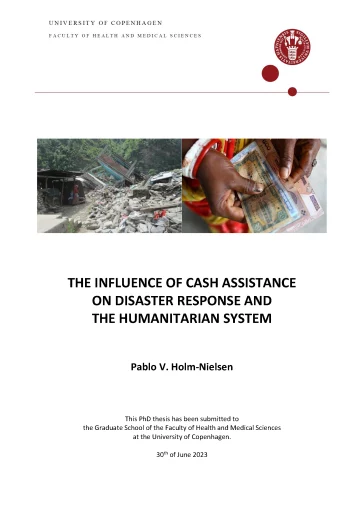The Influence of Cash Assistance on Disaster Response and the Humanitarian System
The research presented in this thesis is based on four studies that cover various aspects of the transformative effect of CVA on humanitarian organizations and the humanitarian system. Study 1 shows the changes that the humanitarian organizations have experienced due to the shift to CVA. New skillsets had to be learned such as market assessments, new procedures had to be established such as relationships with financial service providers and some changes were accelerated such as the establishment of post-distribution monitoring to measure the use and appropriateness of the delivered aid. The changes were for the most part organic and lacked a proper change management strategy.
Study 2 shows the process of diffusion of innovation of novel technologies applied to CVA in the humanitarian sector. Financial technology will in the near future alter the way societies approach the use of money, and therefore, influence or disrupt the way CVA is implemented. Humanitarian organizations will not have the possibility to maintain the required level of technical knowledge and will, therefore, need to establish deeper relationships with the private sector. Innovation and change are challenging in disaster response due to the potential effects on accountability for the affected population.
Study 3 analyses the interaction of CVA and the localization agenda in Kenya. The context was chosen because both CVA and localization are well established and hence, their interaction can be studied more effectively. A framework with seven dimensions of localization applied to CVA was developed for the analysis. The study shows that one of the most important contributors to localization is the creation of a network of local actors that gives small local organizations a voice in the system. CVA can facilitate this process because it gives the opportunity of being part of disaster response without the investment in logistics setups. Local actors can influence the programmatic aspects of the delivery of aid due to the flexibility of CVA. An important condition for the mutual benefit of CVA and localization are personal values of the professionals involved. Managers in INGOs need to be willing to give up power and influence, and experienced local professionals need to be willing to work in the national context.
Finally, study 4 shows that CVA has transformed the humanitarian system. CVA affects the core issues that the humanitarian system is facing. These are power relations, coordination and the sectorial nature of disaster response. The humanitarian system needs further transformation and CVA can be a strong contributing factor to this transformation. Donors favour giving CVA resources to a single agency or consortium in a given context and not all organizations are going to be involved in CVA implementation in the future. Some aspects of disaster response will continue being delivered through the in-kind modality. These activities need to be defined and delivered by increasingly specialised organizations. Humanitarian organizations will need to review their role and identity in this changing landscape.
The change in the nature of disasters and the transformation created by financial technology may create a paradigm shift in the humanitarian sector and in disaster response in the near future. Based on the experiences from the past and the persistent reluctance to change, it can be concluded that the humanitarian organizations and the humanitarian system are not ready for that paradigm shift. Humanitarian organizations need to become more adaptable to the changing environment by creating change management, organizational learning and innovation processes. The incentives for humanitarian organizations and for professionals in the system need to be aligned with the aims and purpose of disaster response. The humanitarian system needs to ensure that in the privatization of disaster response, the humanitarian principles are respected and applied.



